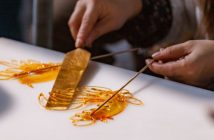 For families with children who have food allergies, life in Beijing can be frightening and difficult to navigate. Many foods contain common allergens, and because of linguistic and cultural barriers, avoiding allergens is an immense challenge – but there are ways to manage. For insight into food allergies and coping in Beijing, we spoke to Dr. Mary Jayne San Jose Ziermann, a pediatrician at Beijing United Family Hospital (BJU). Dr. Ziermann specializes in allergies and asthma, and is completing her master’s degree in allergy in the UK.
For families with children who have food allergies, life in Beijing can be frightening and difficult to navigate. Many foods contain common allergens, and because of linguistic and cultural barriers, avoiding allergens is an immense challenge – but there are ways to manage. For insight into food allergies and coping in Beijing, we spoke to Dr. Mary Jayne San Jose Ziermann, a pediatrician at Beijing United Family Hospital (BJU). Dr. Ziermann specializes in allergies and asthma, and is completing her master’s degree in allergy in the UK.
What Is a Food Allergy?
A food allergy is an immune response to a certain protein. Upon contact or ingestion of the protein, the immune system treats it as a foreign body and recruits immune defense mechanisms to combat the protein. Symptoms include vomiting, diarrhea, hives, and swelling within 15 to 30 minutes of ingestion. The food groups that most commonly cause food allergies are milk, peanuts, tree nuts, eggs, fish, shellfish, soy, and wheat.
The good news is that a majority of children outgrow their allergies, as their immune system becomes desensitized to the protein it originally perceived as a threat. However, two allergies that tend to persit into adulthood are shellfish and nuts. Unfortunately, the only treatment for a food allergy is complete avoidance of the food. As of yet, there are no cures, but many allergists agree that the best prevention is breastfeeding.
Diagnosing a food allergy is an arduous process. There are two common tests: a blood test that notes the levels of antibodies to a certain protein, and a skin prick test, which uses scratches and needle pricks on the skin to see if certain substances elicit an allergic reaction. “[Those test results are] still inconclusive, because you need to correlate [the results]with the overall clinical picture of the person,” says Dr. Ziermann. This involves consideration of one’s history and detailed questions about what was eaten and when, and specifics about the reaction. The most important factor in diagnosing a true allergy over an intolerance or hypersensitivity is reproducibility: the same reaction to the same food.
Because of the inconclusive nature of the tests, many food intolerances, malabsorption syndromes, and hypersensitivities are misdiagnosed as allergies. Dr. Ziermann reports: “True food allergies exist in a small proportion of the population. Twenty to 30 percent of people perceive that they have food allergies, but in reality, among children, only 4 to 7 percent have true allergies, and only 2 to 3 percent of adults have true allergies.” The largest problem that results from this mistake, she says, is because a child’s diet is often restricted to completely exclude a food group that has vital nutrients required for health and growing.
Coping at Home
Carol Kim, the vice president of planning and communications at YueCheng Education, and her husband, Tim Chin, arrived in Beijing in July with their 7-year-old son Ever and their 3-year-old daughter Zumi. Zumi is allergic to dairy, eggs, soy, nuts, and fish. Coping with limitations in both diet and language can prove challenging, especially because
Beijing does not have extensive resources when it comes to food allergies. According to Dr. Ziermann, food allergies are either virtually non-existent or drastically underreported among the local Chinese population; education regarding food allergies is similarly lacking.
Kim jokes that she keeps a Zumi-Kosher house. “We have a separate kitchen sponge for Zumi and we microwave all of our sponges for one minute,” she says. For surfaces, soap and water are generally effective in removing the proteins of food allergens. It may also be a good idea to have separate pots, pans, and cutting boards.
Dr. Ziermann notes that if one child has a food allergy and the other does not, it’s important that the child with the allergy not feel socially excluded. She encourages the whole family to participate in keeping all its members healthy. This also extends to any ayi or caregiver, who should be thoroughly educated in the child’s food allergy and instructed in how to administer the correct medication in the event of an allergic reaction. “We have a wonderful ayi who prepares two separate meals for our family at all times. She understands Zumi’s allergies and is very careful,” says Kim.
Beyond the Home
Eating out at any Chinese restaurant is nearly impossible with allergies to soy or nuts, since many foods are fried in peanut oil or soybean oil. Kim explains: “When we do decide to go out somewhere, we either pack Zumi her own food or we talk to the manager and the chef so there is no misunderstanding of what she can eat.” Kim has found that Korean restaurants usually meet their needs, as they have meats that have not been marinated. When talking to managers and chefs, she explains, “[My husband and I] keep it simple and make suggestions, rather than rattle off all the foods Zumi cannot eat.”
Finding and buying food isn’t much easier. “There is only one store in Beijing that carries [Organic Original Rice Dream], Zumi’s brand of rice milk: City Shop.” Foreign grocery stores like Jenny Lou, Jenny Wang, and April Gourmet carry small selections of certain allergen-free foods, but stock can be erratic. Buying locally-made foods in local stores is especially tricky, cautions Dr. Ziermann, as there is no transparency when it comes to food labeling, and some ingredients may simply be omitted. While there is no way around that for now, Dr. Ziermann provides training and education to her patients on how to read food labels in Chinese.
It’s imperative that the child’s school be aware of a child’s food
allergies and proactive in keeping him or her safe. Zumi and her brother both attend Beijing City International School (BCIS), and Kim says: “BCIS has been super supportive of all our needs. They make sure Zumi does not eat anything without advance notice, make sure her food does not become cross-contaminated, and let us know if there is a special celebration where treats are being served, so we can prepare for Zumi so she isn’t left out.”
Resources
Currently, there are very few resources in Beijing for coping with or testing for food allergies, but Dr. Ziermann is in the process of establishing an allergy center at BJU, which she hopes will open next year. BJU also has a nutritionist on staff, who can help provide families with insight into more trusted food brands, labels, and restaurants. Epi-pens, which have an easy-to-administer dose of epinephrine in the case of anaphylaxis, are not readily available in China, says Dr. Ziermann. However, BJU’s pharmacy does have vials of epinephrine which can be administered via syringe. While syringes are not as fast and easy to use as an Epi-pen, having multiple doses of medicine to keep at home, at work, at school, and in purses is highly recommended.
Dr. Ziermann stresses that education is the most important thing with schools, ayis, or anyone who spends time with the child. “Families should have an action plan,” she says. And that action plan should be shared with teachers, school officials, ayis, teachers, friends, and parents of friends.
Kim is also a member of a Yahoo! Group called BJ Food Allergies and Special Diets, which is a valuable resource and community where families share how they deal with food allergies. The most important factors in coping with a food allergy are education for the patient and her parents, and staying positive. While Kim acknowledges that coping with food allergies is not easy, the family enjoys freshly food that is fresh and not processed. In that respect, the family eats healthier, and as Kim says, “This is a great opportunity to go back to basics.”
Beijing United Family Hospital 北京和睦家医院
Mon-Sun 8.30am-5.30pm. 24-hour emergency care. 2 Jiangtai Lu, Chaoyang District (55927 7000, 5927 7120 ER) www.ufh.com.cn 朝阳区将台路2号
Beijing United Family Clinics
1) Mon-Fri 9.30-7.30 pm, Sat-Sun 9.30am-4.30pm. 818 Pinnacle Plaza, Tianzhu Real Estate Development Zone, Shunyi District (8046 5432) www.ufh.com.cn 顺义区天竺房地产开发区日荣祥广场818号; 2) Mon-Fri 8.30am-5pm. DRC Liangma Qiao, Chaoyang District (5927 7005) www.ufh.com.cn 朝阳区亮马桥外交公寓; 3) Mon-Sun 8.30am-3.30pm. St. Regis Wellness Center, B1/F, 21 Jianguomenwai Dajie, Chaoyang District (8532 1678) www.ufh.com.cn 朝阳区建国门外大街21号国际俱乐部饭店地下1层
The Food Allergy and Anaphylaxis Network
www.foodallergy.org
City Shop
Daily 8am-10pm. B1/F, The Grand Summit, Liangmaqiao
Diplomatic Compound, Chaoyang District (8532 3488, richard@cityshop.com.cn) www.cityshop.com.cn 朝阳区东方东路19号亮马桥外交公寓1号楼会所地下一层
BJ Food Allergies & Special Diets
health.groups.yahoo.com/group/BJFoodAllergiesSpecialDiets



